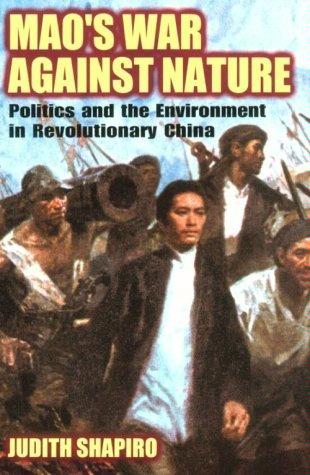
Films & VideoWaking the Green Tiger |
|
|
|
|
Mao's War Against Nature by Judith Shapiro, Cambridge University Press 2001 Dr. Judith Shapiro is the author of Mao's War against Nature and the co-author of Son of the Revolution and other books on China. She teaches Environment and Politics, the Washington Environmental Workshop, Environmental Politics of Asia, and other graduate and undergraduate courses at the School of International Service at American University in Washington DC. Photo credit American University
Judith Shapiro relates the great, untold story of the devastating impact of Chinese politics on China's environment during the Mao years. Maoist China provides an example of extreme human interference in the natural world in an era in which human relationships were also unusually distorted. Under Mao, the traditional Chinese ideal of "harmony between heaven and humans" was abrogated in favor of Mao's insistence that "Man Must Conquer Nature." Mao and the Chinese Communist Party's "war" to bend the physical world to human will often had disastrous consequences both for human beings and the natural environment. Mao's War Against Nature argues that the abuse of people and the abuse of nature are often linked. Shapiro's account, told in part through the voices of average Chinese citizens and officials who lived through and participated in some of the destructive campaigns, is both eye-opening and heartbreaking. Judith Shapiro teaches environmental politics at American University in Washington, DC. She is co-author, with Liang Heng, of several well known books on China, including Son of the Revolution (Random House, 1984) and After the Nightmare (Knopf, 1986). She was one of the first Americans to work in China after the normalization of U.S.-China relations in 1979. Review: Publishers WeeklyMuch has been written on the human suffering in China under Mao Zedong, and a growing literature has examined the environmental degradation of this period. In this unique and important study American University environmentalist Shapiro, co-author with Liang Heng of three previous books on China, combines the two themes. Her thesis is "that the abuse of people and nature are often interrelated," and that Mao's China is an extreme case of this connection. Under Mao, China was a place of fierce repression and constant mobilization of the "masses." Through the power of their will and obeisance to Mao, it was believed the masses would develop China. Nature, then, was the enemy to be conquered, but it was not the only one; anyone who disagreed with Mao was an enemy as well, and could be banished, imprisoned or killed. Thus, as Shapiro shows in finely crafted case studies, Mao launched a series of utopian mass development schemes tempered neither by scientific caution nor by democratic political opposition. As Mao ignored warnings on China's explosive population growth, deforestation projects and overuse and misuse of the land led to massive famine in the 1960s. Local practices were disregarded as Mao demanded the uniform application across China of questionable policies such as the forced growing of grain no matter what the local conditions. Through these and other similar schemes, by Mao's death in 1976 both nature and the masses were exhausted and ruined. Mao's most lasting legacy, Shapiro observes, may be a cynicism and disillusionment among the Chinese people that makes them suspicious of any public goals, including the environmental reclamation of China.
Review by Cripsin Tickell Politics and the Environment in Revolutionary China, by Judith Shapiro. Cambridge University Press 2001Between 1949 and 1976 Mao Zedong enjoyed political power, and applied what he called Marxism-Leninism-Mao Zedong thought to the environment and people of China. One of his most potent slogans was "Man must conquer Nature", and over the length and breadth of the land and to different degrees a kind of conquest took place. But as Fritz Schumacher once wrote, "man talks of a battle with Nature, forgetting that if he won the battle, he would find himself on the losing side". In this case China was certainly the loser. There are three broad philosophical traditions in China. One springs from Daoism which looks to accommodation with nature, and is best encapsulated in the slogan, "Harmony between the Heavens and Human Kind"; one springs from Buddhism with its reverence for all living creatures; and one springs from Confucianism with its respect for authority, including control and mastery of the natural environment. Although Mao was most influenced by the Soviet experience with its forced industrialization, collectivization of agriculture and overturning of established hierarchies, he falls well within the Confucian tradition and relied upon it crucially for the application of his ideas and policies. Judith Shapiro has had a long experience of China, beginning as a teacher in the period following Mao's death and returning from time to time, most recently last year. Her book is the product of discussion with all kinds of Chinese, including some of the surviving victims of the Mao years. Her thesis has three main aspects. The first relates to the policy framework. Like others at the time, Mao associated the recovery of China as a world power with an increase in human population. Thus whatever might happen in terms of war or other disasters, the Chinese people would survive. Every encouragement was given to families to reproduce. With greater stability in China, the numbers rose dramatically from around 600 million in 1923 and one billion when Mao died in1976, to about 1.3 billion today. As in the Soviet Union, industrialization was pursued at all levels. Every town and village was encouraged to have its own industrial activity. More drastic still was the development of agriculture, in particular production of grain. Mountains were to be moved, forests cut, dams built, lakes filled up, rivers diverted, wastelands planted, and errant species eliminated (hence the slogan "Wipe out the Four Pests" including sparrows). A central example was given for universal application: no matter that the so called Dazhai model was in many ways fraudulent. The effects on the environment were soon evident, but Mao would not change course. The Chinese environment has long been fragile and vulnerable, and the policies of the 1950s made it more so. But Mao believed that what had worked for other industrial countries should work for China. He ignored the consequences of over-extraction of resources, air, land and water pollution, erosion of hill sides, flooding and salinization of irrigated areas, reclamation that led to desertification, and all the other ills of unsustainable human activity. A telling figure was produced by Qu Geping (one of China's leading environmentalists) and Li Jinchang in 1994: "from 1957 to 1980 the annual net loss of cultivated land averaged 545,000 hectares." Finally come the effects on people. Mao's programme could allow no argument or opposition. It was ruthlessly directed from the centre with little or no regard for local or even regional interpretation, and involved repression not only of other leaders of all kinds, including scientists, but also of peasant communities. People were forcibly resettled and communities disrupted. The conquest of nature was treated as a military campaign with leaders given Army ranks and powers of command. Two phases will survive in Chinese history: the Great Leap Forward, which led to one of the greatest of human famines with deaths calculated between 36 to 50 million between 1959 and 1961; and the Cultural Revolution beginning in 1966, which overturned Chinese society and caused the loss of a whole generation of leaders. Mao's attempt to conquer Nature is an extreme example of what has been tried in other societies at other times under other ideologies. The changes he brought about in a society ravaged by civil war but deeply conservative in character may not all have been bad, and some of them, driven by population pressure, might have happened anyway. But it is still a model of what not to do. Subsequent Chinese governments have been trying to pick up the bits, and put rational policies together again. In doing so they have had to cope with public cynicism, and with vested interests relying on inertia and the mythology carried forward from the Mao years. There is now another danger. The shift from a centralized to a market economy could all too easily add to the environmental hazards. Here there is an opportunity, so far barely recognized elsewhere, to establish true environmental costs in regulating the economy and to set up a framework of public interest. In 1992 the Chinese government created a China Council for International Cooperation in Environment and Development with a mixed membership of Chinese and foreign members enjoying direct access to the leadership. This is already having effects on the formulation of policy in which China this time might be the pioneer. Judith Shapiro's well written book could be misinterpreted as a polemic. It tells a shocking story which needs to be told, but it ends on a note of hope. The Chinese now have the chance to re-establish that traditional harmony with Nature which was once their ideal. They deserve to succeed.
Additional reviews and articles
|









